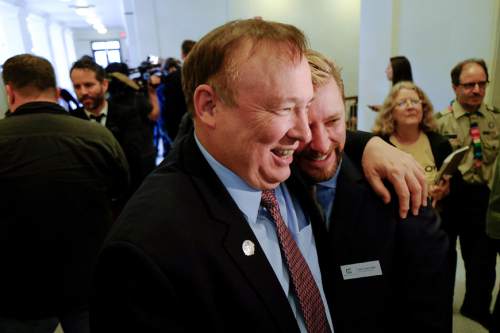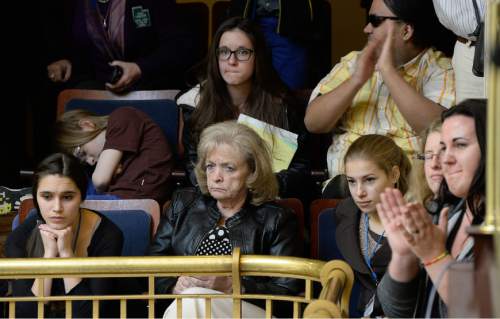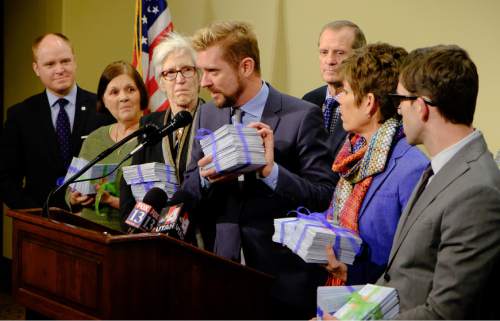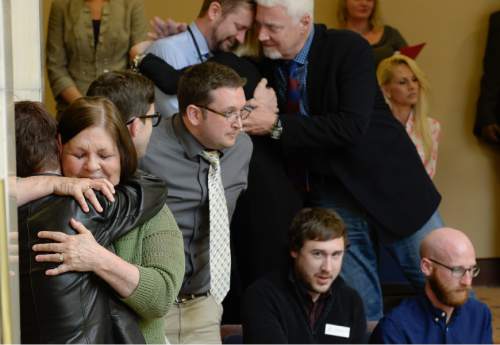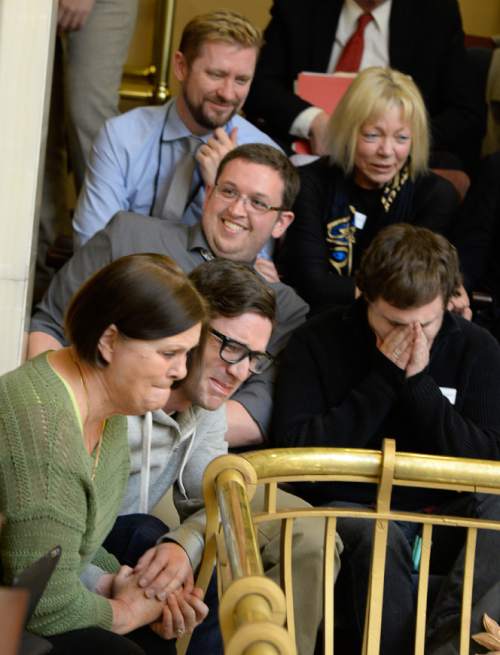This is an archived article that was published on sltrib.com in 2015, and information in the article may be outdated. It is provided only for personal research purposes and may not be reprinted.
Utah's Senate on Friday advanced historic compromise legislation that would bar discrimination in housing and employment for the LGBT community, while offering religious liberty protections in the workplace.
SB296 passed on a 23-5 vote, two days after it debuted in a Capitol Hill press conference, which saw Utah's lesbian, gay, bisexuals and transgender leaders stand beside lawmakers from both parties and two Mormon church general authorities to jointly endorse the bill.
The vote brought tears and a round of cheers and from the standing-room-only Senate gallery, as LGBT activists and their supporters offered the body a standing ovation. SB296 now moves to the House.
This is the seventh year LGBT leaders have pushed for statewide nondiscrimination protections, but the only time such legislation has not died in a committee hearing, been buried or pushed off for interim study.
Last year, 13 gay activists, including Equality Utah Executive Director Troy Williams, were arrested trying to force lawmakers to address the issue. They were later charged with misdemeanors and their cases are still pending in Salt Lake City's Justice Court.
"This is a stunning, historic day. I couldn't stop crying through it. This says that LGBT Utahns belong in this state. We belong here and we are being woven into the legal fabric of the state," Williams said between hugs with supporters in the hall after the vote. "What a difference a year makes."
Sponsored by Sens. Stuart Adams, R-Layton, and Steve Urquhart, R-St. George, the bill is now headed for a House committee hearing.
Gov. Gary Herbert has called the measure "a good model for the rest of the country," and said he would sign SB296 if it comes to his desk.
If it becomes law, SB296 would amend Utah's existing anti-discrimination laws for housing and employment to include sexual orientation and gender identity, clarify exemptions for religious institutions and provide protections for religious expression.
The measure would make it unlawful for employers and landlords to discriminate against individuals based on their sexual orientation or gender identity.
Religious organizations and their affiliates would be exempt from the bill's requirements.
The exemptions, which apply to all religious organizations and their affiliates, were concessions to the LDS Church after the faith's leaders said in January they would support a bill if it included protections for the expression and exercise of faith.
Under SB296, workers could not be fired for expressing beliefs on marriage, family or sexuality unless they conflicted with the employer's business interests.
The legislation also would allow employers to set "reasonable" dress-and-grooming standards and policies on sex-specific restrooms, but would have to make "reasonable accommodations" based on gender identity.
Some supporters of the bill spoke emotionally about their own experiences with racial discrimination, religious discrimination faced by early Mormons and their personal evolution on the question of LGBT rights or understanding of sexuality.
"We all have an equal right to pursue happiness," Sen. Howard Stephenson, R-Draper, said, noting the Legislature's "rocky" history on gay-rights issues. "When we have a right to operate in the public square we have a moral obligation to treat everyone equally."
Detractors — only three spoke — questioned how the bill's drafters defined "sexual orientation" and wondered whether it would grant special rights to LGBT individuals or fell short in protecting individuals with deeply held religious beliefs.
The Senate's only black member, Sen. Alvin Jackson, R-Highland, spoke passionately against the bill, saying he was offended by comparisons between gay rights and the civil-rights movement of the 1960s.
"I can't accept that," said Jackson, who said his mother grew up attending segregated schools and that a relative of his step-father had been lynched. "I will never accept that. My black, Baptist roots won't allow me to accept what's in the legislation. I just can't get there."
The bill, SB296, specifically would exempt the Boy Scouts of America, leaning on a 2000 U.S. Supreme Court decision that declared the Scouts could not be forced to hire gay leaders.
Nineteen Utah municipalities already have local ordinances that bar discrimination against the LGBT community in housing and employment. Those laws would be voided if SB296 is enacted.
The proposal also includes a nonseverablity clause, which means that if any part of it was struck down by the courts, the entire law would be scrapped. It would have supremacy over existing local ordinances enacted across Utah.


